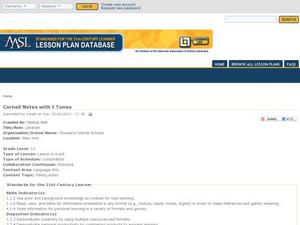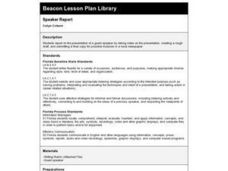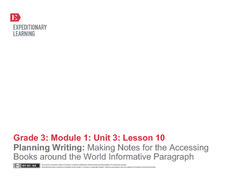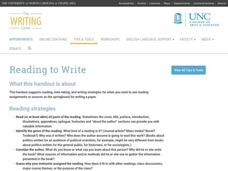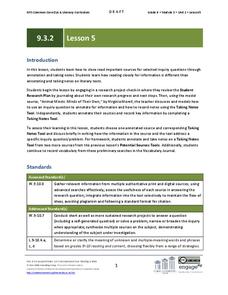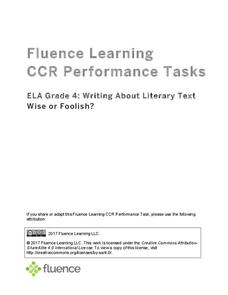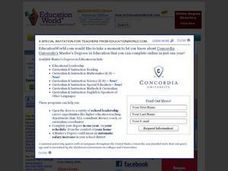EngageNY
Reading and Taking Notes on Colonial Trades
In the tenth instructional activity of this unit, young scholars learn to categorize information as they continue researching their colonial trade. During guided practice, the teacher models how to read informational text slowly while...
EngageNY
Taking Notes Using a Graphic Organizer: Inferring About Work and Play in Colonial America
What was life like in colonial America? Follow this lesson and your pupils will find out what people in colonial times did for work and for fun. Ask learners to compare and contrast the two texts and explain what the reading helped them...
Curated OER
Note Taking
Third graders get ready to take notes on a field trip. In this notetaking lesson, 3rd graders take notes to remember what they've seen on a field trip. Students draw and analyze diagrams of what they have seen. Students...
Curated OER
Cornell Notes with I Tunes
Note taking is an invaluable skill and requires practice. This lesson incorporates the Cornell Notes format, however the plan itself could be implemented to teach any style. The basic idea here is to use university lectures on podcasts...
Curated OER
Writing in Note Form
Taking notes is the topic today. Kids learn why notes are taken, when they are useful, and how to pick out the most important information to make their notes functional. Several interesting examples of various note forms are shown, along...
Curated OER
Listening To a Guest Speaker
Pupils review the main points of note-taking to summarize the content of a formal or informal spoken presentation. They hear a guest speaker talk about a pre-arranged topic and take notes during the presentation. Next, they write a...
Curated OER
Information Reports
Students practice essay skills. In this essay skills lesson, students select an essay subject and take notes for their topic. Students create a web for their essays. Students organize, write, revise, and publish their essays.
EngageNY
Mid-Unit 3 Assessment: On-Demand Note-Taking about Howler Monkeys
Get the facts straight. Scholars complete their mid-unit assessment by reading a text, watching a video, and observing a picture about howler monkeys. They take notes about the facts they discover to use in future lessons.
EngageNY
Introducing “If” and Noting Notices and Wonders of the First Stanza
After reading chapter 14 of the story Bud, Not Buddy by Christopher Paul Curtis, scholars take part in a read-aloud of the poem If by Rudyard Kipling and compare it to the reading of Bud, Not Buddy. Learners then go deeper into the poem...
Curated OER
Speaker Report
Fifth through eighth graders think of themselves as newspaper reporters as they listen to a presentation by a guest speaker. As reporters, they take notes during the presentation. Using these notes, they create a rough draft and then a...
EngageNY
End of Unit 2 Assessment: Working with Two Texts - Reading, Listening, Summarizing, and Synthesizing
As a summative assessment for this unit on colonial trade, fourth graders listen to and read informational texts in order to demonstrate their ability to take notes, write summaries, and draw connections. Young scholars first listen as...
EngageNY
Planning Writing: Making Notes for the Accessing Books Around the World Informative Paragraph
Encourage your young writers to thoughtfully plan and organize their work. First, model how this is done and vocalize your thought process as you work. Next, create a class list of strategies that they can use during independent writing...
University of North Carolina
Reading to Write
Silly journal and essay prompts may be fun to write, but they don't model the kind of writing needed for college papers and standardized tests. The 15th part in a series of 24 covers the concept of reading to write—during and after...
EngageNY
Grade 9 ELA Module 3, Unit 2, Lesson 5
Once you find and evaluate your sources, it's time to discern the most helpful information. In a research lesson plan based on questions derived from Temple Grandin's Animals in Translation, practice annotation and taking notes.
Fluence Learning
Writing About Literary Text: Wise or Foolish?
A three-part assessment promotes reading comprehension skills. Class members read literary texts and take notes to discuss their findings, answer comprehension questions, write summaries, and complete charts.
EngageNY
Looking Closely at Stanza 3—Identifying Rules to Live By Communicated in “If”
Just as Bud, from the novel Bud, Not Buddy by Christopher Paul Curtis, had rules to live by, so does the poem, If by Rudyard Kipling, but how do the two relate? Pupils delve deep into the poem's third stanza, participate in a grand...
Curated OER
Take this Job and Love It!
High schoolers need to be prepared to enter the job market during or after high school. Here are six preparational activities geared at getting those kids ready to enter the job market. They conduct research on various jobs, learn...
California Education Partners
My Librarian is a Camel
A two-part assessment challenges scholars to gather information from reading then write an opinion piece. In part one, learners read, take notes, and answer text-related questions. In part two, participants use their new-found knowledge...
iCivics
We the Jury
Learners take on the roles of jurors in a civil case to evaluate evidence and determine a verdict in this engaging online interactive experience.
Curated OER
Note Taking By Crayon
Skim a brief biography of Amelia Earhart with your class, and then assign groups of researchers one of four topics listed: Amelia's family life, important airplane flights during Amelia's life, turning points in Amelia's life, and...
Maine Content Literacy Project
Introduction to the Short Story
How should pupils read short stories? Set them up for this unit with an introductory lesson that goes over the main characteristics of a short story and starts learners off reading their first short story of the unit. In order to get a...
Curated OER
Introduction to Age of Absolutism
Who were the absolute monarchs of Europe and what effect did they have on their countries? Young historians begin by naming qualities they believe are important for a monarch to possess. They then take notes on four key factors...
Curated OER
Think Pair Share
Here is a great tool to help train your learners what to do during a think pair share! The graphic organizer has a place for your learners to put the title, their partner's name, notes during their peer discussion, and a place to record...
Brigham Young University
Rosencrantz and Guildenstern Are Dead: Fishbowl Discussion
After reading through Act II of Rosencrantz and Guildenstern Are Dead, take some time to discuss the references to death in the play. For this fishbowl discussion, learners prepare questions, practice answering individually and with...



